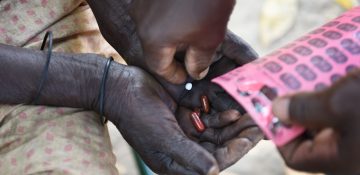Partners
In both Mozambique and Nigeria, we will work together with a range of stakeholders/partners in order to optimize effectiveness, efficiency, and sustainability. Next to the partners mentioned below, this project will target a range of other actors, which are all relevant in one way or the other to the success of the project.

Supporting global initiatives towards zero leprosy
The potential of SDR-PEP is enormous, and the implementation is only just starting. At this crucial stage in the development and implementation of PEP globally, our aim is to support and play a leading role in the larger global movement towards zero leprosy. There are a number of promising international initiatives in which NLR plays a leading role, which will support the scaling up of SDR-PEP. The Global Partnership for Zero Leprosy (GPZL), International Federation of Anti-Leprosy Organisations (ILEP) and WHO are important platforms for the advocacy towards zero leprosy, and support the upscaling of SDR-PEP.
Mozambique
The support to both high and low endemic areas in Mozambique has been geographically divided between ILEP members present in-country, which are currently NLR Mozambique, TLM Mozambique and AIFO. In order to maximize our results and scope, we (NLR International and NLR Mozambique) will work together with these organisations to target districts in ‘their’ provinces. The reason for this is that each organisation has gained in-depth context-specific knowledge, established relationships with relevant local stakeholders and has created access in these areas, which is crucial to a successful implementation of the project. This makes it efficient in terms of cost and time. By working this way, we can avoid duplication of efforts and share experiences and lessons learned, and together cover a larger part of the endemic areas. NLR and NLR Mozambique together will train the other ILEP members and ensure that they have adequate knowledge for the implementation of SDR-PEP in their selected districts. NLR Mozambique will be the in-country lead, and will manage the Mozambican component of the project, monitoring project execution by the other ILEP members as well as executing a number of activities themselves.
All ILEP members will be involved in advocacy initiatives towards the several government agencies that have the authority and mandate to adopt SDR-PEP as a national policy, as well as improve care for persons affected by leprosy.
In addition to the ILEP members, we will also work together with local organisations that represent persons affected by leprosy/disability such as ADEMO and AJODEMO. These organisations will have a role in the set-up and training of self-care groups as well as advocacy towards government.
Furthermore, we will work together with the National Leprosy Control Programme (on all administrative levels) and local health staff (who are part of the Ministry of Health). NLR strongly believes in the fact that health interventions without the support and commitment of the government will not be sustainable, which is why we place so much emphasis on making sure that the leprosy control programme and its staff are capacitated and have the necessary knowledge and skills to do the work, even after this project ends.
Nigeria
In Nigeria, endemic areas are also divided amongst the ILEP members with a local presence. Currently these are LTR, TLM Nigeria, GLRA, and Damien Foundation. In Nigeria, we will follow the same principles as in Mozambique and work closely together with the ILEP members, where each organisation targets endemic LGAs in ‘their’ states. LTR, as NLR’s preferred partner, will manage the Nigerian component of the project and function as the in-country lead. NLR and LTR together will train the other ILEP members and ensure that they have resources for the implementation of SDR-PEP in the selected LGAs. In addition, LTR will monitor the execution of the project by the other ILEP members, as well as executing a number of activities themselves.
All ILEP members will be involved in advocacy initiatives towards the several government agencies that have the authority and mandate to adopt PEP as a national policy, as well as improve care for persons affected by leprosy.
In Nigeria, we will work together with IDEA, an organisation by and for people affected by leprosy, which has chapters in each state. IDEA will have a role in the set-up and training of the self-care groups and advocacy towards government.
We will also work together with the National TB and Leprosy Control Programme on all administrative levels and local health workers, who are part of the Ministry of Health, to ensure future sustainability of our interventions.